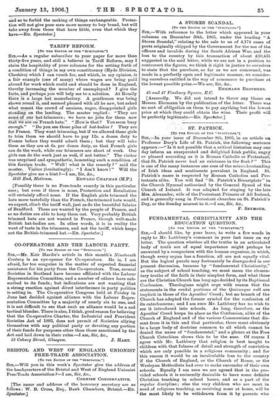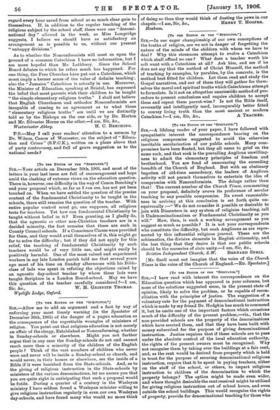FUNDAMENTAL CHRISTIANITY AND THE EDUCATION QUESTION.
LTO THE EDITOR OP TIM "SPECTATOR-1
Sin,—I should like, by your leave, to write a few words in reply to Mr. Lathbury's comment in your last issue on my letter. The question whether all the truths in an articulated body of truth are of equal importance might perhaps be answered by a comparison with the human organism, in which, though every organ has a function, all are not equally vital. But the logical puzzle may fortunately be disregarded in our present discussion, because by "fundamental Christianity," as the subject of school teaching, we must mean the elemen- tary truths of the faith in their simplest form, and what these are the Christian Church has long ago decided by its Baptismal Confession. Theologians might urge with reason that the statements in the credal portions of the Quicunque vult are implicit in those of the Apostles' Creed; but no branch of the Church has adopted the former symbol for the confession of its catechumens; and I am sure Mr. Lathbury has no wish to see it introduced into schools. As long, therefore, as the Apostles' Creed keeps its place as the Confession, alike of the Church of England and of the various Communions that dis- sent from it in this and that particular, there must obviously be a large body of doctrine common to all which cannot be denied the name of "fundamental," and a glance at the Free Church Catechism shows this to be the ease. Of course I agree with Mr. Lathbury that religion is best taught to children with that fulness of detail and strength of conviction which .are only possible in a religious community ; and for this reason it would be an incalculable loss to the country if the Church of England, or the Church of Rome, or the Wesleyan Methodists had ever to make surrender of their own schools. Equally I am sure we are agreed that in the pro- vided schools it is eminently desirable to have some definite Christian teaching in school hours, and as a part of the regular discipline ; else the very children who are most in need of religious teaching, as receiving none at home, will be the most likely to be withdrawn from it by parents who regard every hour saved from school as so much clear gain to themselves. If, in addition to the regular teaching of the religious subject by the school staff, there were one " denomi- national day " allowed in the week, as Miss Longridge suggests, I believe we should have as satisfactory an arrangement as is possible to us, without our present " unhappy divisions."
As to whether the Nonconformists will meet us upon the ground of a common Catechism I have no information, but I am more hopeful than Mr. Lathbury. Since the School Board debates to which he refers much has happened. For one thing, the Free Churches have put out a Catechism, which must imply a keener sense of the value of definite teaching ; also the " Jamaica " Catechism is actually in use. Moreover, the Minister of Education, speaking at Bristol, has expressed the belief that most parents wish their children to be taught " the simple elementary religious truths." I shall not believe that English Churchmen and orthodox Nonconformists are incapable of coming to an agreement as to what these " elementary religious truths " are until we are distinctly told so by the Bishops on the one side, or by Dr. Horton and Mr. Silvester Horne on the other.—I am, Sir, &c.,
P.S.—May I call your readers' attention to a sermon by Dr. Wilson, Canon of Worcester, on the subject of " Educa- tion and Crime" (S.P.C.K.), written on a plane above that of party controversy, and full of grave suggestion as to the national needs ?











































 Previous page
Previous page